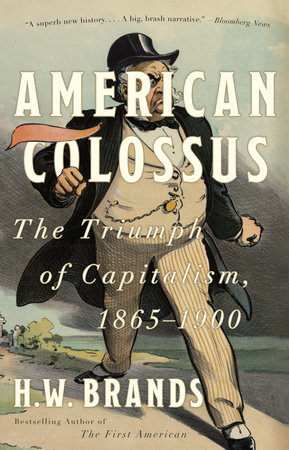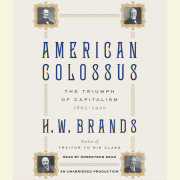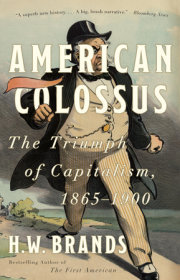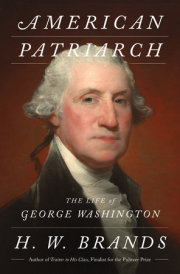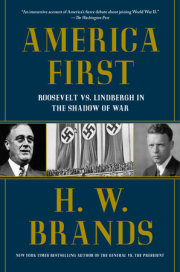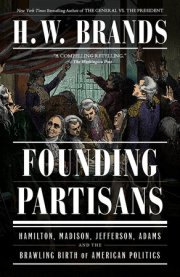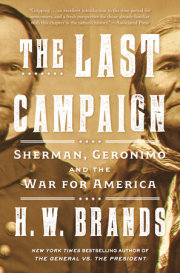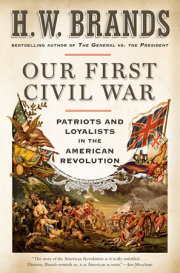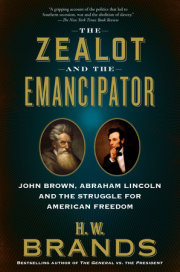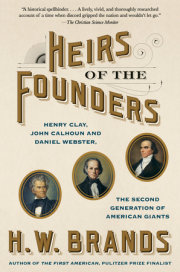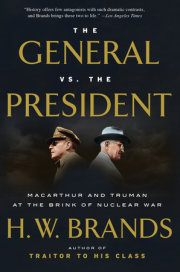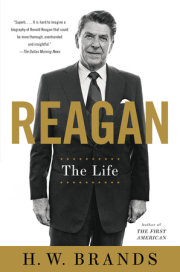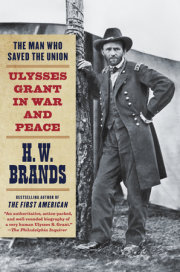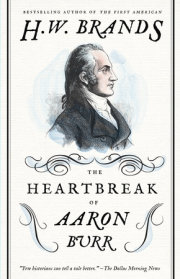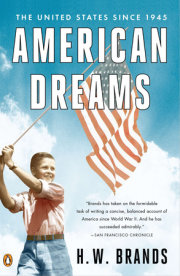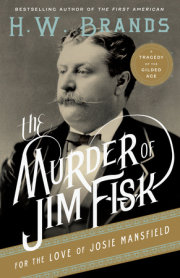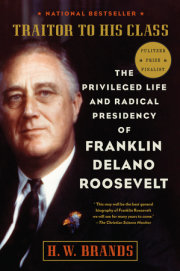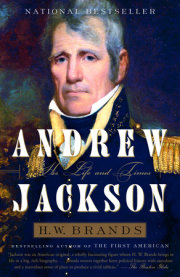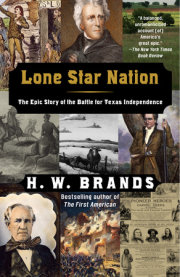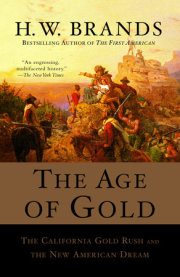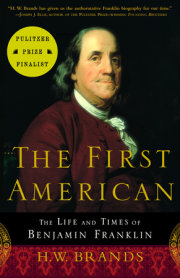Prologue: The Capitalist Revolution
John Pierpont Morgan enjoyed an excellent Civil War. He didn’t fight, although he was prime military material, being in his midtwenties and blessed with solid health. Instead he hired a substitute in the manner of many rich, tepid Unionists. Morgan’s father was a transatlantic banker with one foot in New York and the other in London; to train his son for the business he had sent him to school in Switzerland and college in Germany. The young man’s aptitude for numbers prompted one of his professors at Gottingen to suggest a post on the mathematics faculty, but he replied that he heard the family business calling, and he returned to America to become a commodities trader. In an early transaction he bought a boatload of coffee without authorization; before his astonished superiors could fire him, he unloaded the cargo for a fat profit. They appreciated the income but distrusted the audacity and so declined to make him a partner, whereupon, in 1861, he planted his own flag on Wall Street.
His timing couldn’t have been better, nor his scruples more suited to the opportunities the war afforded. Hearing of a man who had purchased five thousand old carbines from an armory in New York for $3.50 each, Morgan proceeded to finance a second purchaser, who paid $11.50 per gun, rifled the barrels to improve the weapons’ range and accuracy, and sold them back to the government for $22.00 apiece. The government got something for the six-fold premium it paid to repurchase its guns, but not nearly as much as Morgan did.
Morgan speculated in all manner of commodities during the war. Though he didn’t shun honest risk, neither did he unnecessarily court it. He cultivated confidential informants who could tell him, a critical moment before such news became common knowledge, of the latest developments on the battlefield. His rewards were remarkable, especially for one so young. The tax return he filed in the spring of Appomattox revealed an annual income of more than $50,000, at a time when an unskilled worker counted himself lucky to get $200.
Morgan wasn’t alone in profiting from the nation’s distress. Andrew Carnegie had clerked on the Pennsylvania Railroad during the decade before the war; by the time the war ended he was crowing, "I’m rich! I’m rich," from his speculations in railroads, iron, and oil. John D. Rockefeller focused on oil and did even better than Carnegie, creating the company that would show America and the world what an industrial monopoly looked like and how it behaved. Jay Cooke sold more than a billion dollars of bonds for the Union and took several hundred thousand in commission for himself. Cornelius Vanderbilt lengthened his lead as the richest man in America by diversifying from steamboats into railroads. Jay Gould learned the ways of Wall Street and the weaknesses of the federal government as he prepared for a breathtaking assault on the nation’s gold supply. Daniel Drew, Gould’s occasional partner, summarized the mood of the entrepreneurial classes: "Along with ordinary happenings, we fellows in Wall Street had the fortunes of war to speculate about, and that always makes great doings on a stock exchange. It’s good fishing in troubled waters."
When Abraham Lincoln honored the heroes of Gettysburg after the battle that largely decided the war, he carried his listeners back to the dawn of American freedom, to the moment when Thomas Jefferson drafted and the Continental Congress approved the Declaration of Independence. Jefferson’s assertion that all men were created equal provided the basis for democracy--the government of, by, and for the people Lincoln proclaimed the Gettysburg dead had died defending.
Yet another manifesto of 1776 was beginning, by the time of the Civil War, to exert as much influence over American life. Adam Smith’s Wealth of Nations was to capitalism what Jefferson’s Declaration was to democracy; where Jefferson cited natural law to justify a politics of self-government, Smith appealed to human nature in support of an economics of self-interest. Democracy didn’t spring fully formed from Jefferson’s brow, nor capitalism from the brain of Smith; each required decades to evolve and mature. But nowhere did they mature more fully than in the United States, which became the world’s archetype of a capitalist democracy.
Yet the dual manifestos of 1776 were also dueling manifestos. The visions limned by Jefferson and Smith were in some ways complementary, with each claiming to maximize personal freedom, the first in politics, the second in economics. But in other respects they were antagonistic. Democracy depends on equality, capitalism on inequality. Citizens in a democracy come to the public square with one vote each; participants in a capitalist economy arrive at the marketplace with unequal talents and resources and leave the marketplace with unequal rewards. Nor is inequality simply a side effect of capitalism. A capitalist economy can’t operate without it. The differing talents and resources of individuals are recruited and sorted by the differential rewards, which reinforce the original differences. Inequality drives the engine of capitalism as surely as unequal temperatures drive heat engines--including the steam engines that were the signature devices of industrial capitalism.
Tension between capitalism and democracy has characterized American life for two centuries, with one and then the other claiming temporary ascendance. During the first half of the nineteenth century, democracy took the lead, as the states abandoned property qualifications for voting and the parties responded by courting the masses of ordinary men. Andrew Jackson embodied the democratic ethos, by both his humble origins and his reverence for the people as the wellspring of political legitimacy. Jackson waged political war on the pet projects of the big capitalists of his day, smashing the Bank of the United States, vetoing federal spending on roads and canals, and beating down tariff rates.
But capitalism fought back during the Civil War. Even as the Republican party freed the slaves, it emancipated the capitalist classes from the constraints imposed by Jackson and his Democratic heirs. Government became the sponsor of business rather than its foe, underwriting railroad construction, raising tariff rates, creating a national currency, and allowing the likes of Morgan to troll for fortunes in the troubled waters of the war.
And the war was just the beginning of the capitalist ascendance. Morgan’s peace proved even better than his war. He never became as wealthy as Carnegie, Rockefeller, or some of the other great capitalists of the era; upon the reading in 1913 of Morgan’s will, which showed an estate of $68 million (exclusive of an art collection valued at $50 million), Carnegie lamented, "And to think, he was not a rich man." Yet Morgan’s power was more pervasive than the others’. Carnegie dominated steel, the industry on which modern America was, almost literally, built, and Rockefeller controlled oil, which lit, lubricated, and was beginning to power American life. But Morgan commanded money, the philosopher’s stone of modern capitalism. Morgan money’s reorganized the railroads, the nation’s vascular system. It bought out Carnegie and fought off Rockefeller to create the largest corporation in American history to that time, the United States Steel trust. And in one telling instance, it rescued President Grover Cleveland and the federal government from financial catastrophe.
In his lighter moments Morgan played at being a pirate. He cruised about in a black-painted yacht he called the Corsair; he read of the exploits of that other famous Morgan, the English buccaneer Henry, and wondered if they were related. But Morgan was more than a pirate. He was a revolutionary. Pirates prey on the status quo; Morgan dismantled and rebuilt it. During the decades after the Civil War, Morgan and his fellow capitalists effected a stunning transformation in American life. They turned a society rooted in the soil into one based in cities. They lifted the standard of living of ordinary people to a plane associated, not long before in America and for decades after elsewhere, with aristocracy. They drew legions of souls from foreign countries to American shores. They established the basis for the projection of American economic and military power to the farthest corners of the planet.
They didn’t do this alone, of course. A secret of their success was their ability to harness the strength and skill of armies of men and women to their capitalist purposes. More than a few of these foot soldiers participated unwillingly in the revolution; many hated Morgan and his ilk and passionately opposed them. But the nature of revolutions is to sweep the reluctant along, and despite the protests of farmers, laborers, and others attuned to a different time and sensibility, the capitalist revolution surged forward.
It left not a single area or aspect of American life untouched. It roared across the South, wrenching that region from its feudal past into the capitalist present, reshaping relations of race, property, and class and integrating the Southern economy into the national economy. It burst over the West, dictating the destruction of aboriginal economies and peoples, driving the exploitation of natural resources and making the frontier of settlement a frontier of national--and global--capitalist development. It crashed across the urban landscape of the East and North, turning cities into engines of wealth and poverty, opulence and squalor, that confirmed cardinal tenets of the American creed even as it contradicted others. It swamped the politics of an earlier era, capturing one major party and half the other, inspiring the creation of a third party, and determining the issues over which all three waged some of the bitterest battles in American history. It demanded, and received, the protection of the courts, which reinterpreted the Constitution in capitalism’s favor.
In accomplishing its revolution, capitalism threatened to eclipse American democracy. Morgan never ran for political office, but his mastery of finance afforded him more power than any elected official save the president, and sometimes even more than the president. No senator or governor so directly controlled the lives of so many people as Carnegie, whose hundreds of thousands of employees looked to him for the wages on which they and their millions of dependents relied. Rockefeller held whole regions hostage to his petroleum monopoly; he browbeat city governments, extorted favors from the states, and defied the federal government to rein him in. Lesser princes of the capitalist clan were hardly more accountable to the tens of millions who worked for them or purchased the goods and services they provided.
Wealth had always conferred power, but never had a class of Americans been so wealthy as the great capitalists of the late nineteenth century, and never had such a small class wielded such incommensurate power. By the century’s end the imperatives of capitalism mattered more to the daily existence of most Americans than the principles of democracy. The old forms of law and politics survived, not least since the capitalists couldn’t be bothered to change them. "What do I care about the law?" bellowed Cornelius Vanderbilt. "Hain’t I got the power?" He did have the power, and with it he and the other capitalists dominated American life. Whether their advantage would prove more durable than democracy’s earlier edge, none of them could tell. But for the time being, in the land of Jefferson the sons of Smith held sway.
Copyright © 2010 by H.W. Brands. All rights reserved. No part of this excerpt may be reproduced or reprinted without permission in writing from the publisher.

